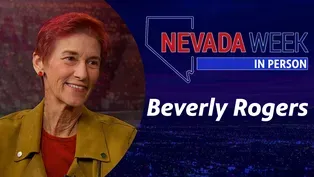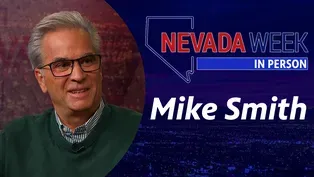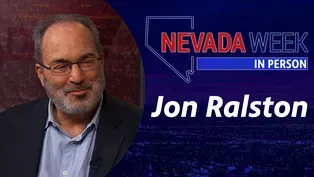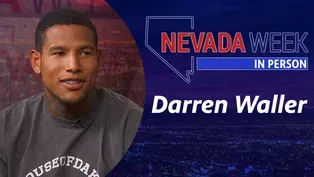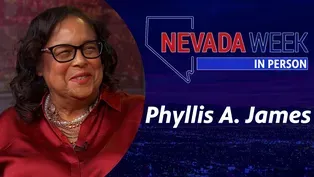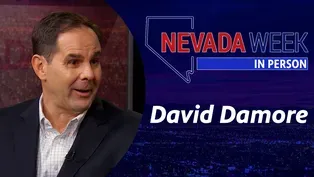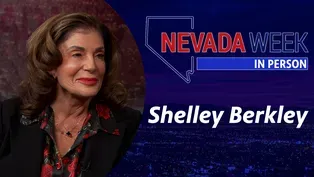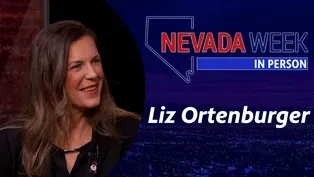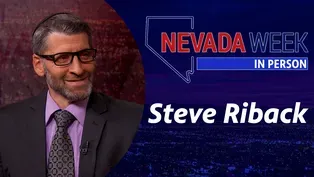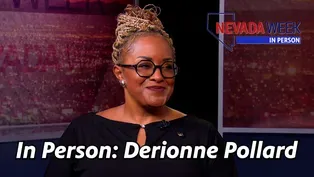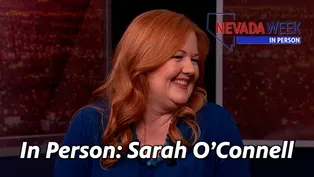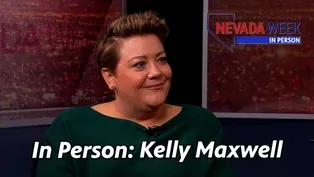
Nevada Week In Person | Amber Renee Dixon
Season 1 Episode 14 | 14mVideo has Closed Captions
One-on-one with the new host of Nevada Week, Amber Renee Dixon.
One-on-one interview with the new host of Nevada Week, Amber Renee Dixon.
Problems with Closed Captions? Closed Captioning Feedback
Problems with Closed Captions? Closed Captioning Feedback
Nevada Week In Person is a local public television program presented by Vegas PBS

Nevada Week In Person | Amber Renee Dixon
Season 1 Episode 14 | 14mVideo has Closed Captions
One-on-one interview with the new host of Nevada Week, Amber Renee Dixon.
Problems with Closed Captions? Closed Captioning Feedback
How to Watch Nevada Week In Person
Nevada Week In Person is available to stream on pbs.org and the free PBS App, available on iPhone, Apple TV, Android TV, Android smartphones, Amazon Fire TV, Amazon Fire Tablet, Roku, Samsung Smart TV, and Vizio.
Providing Support for PBS.org
Learn Moreabout PBS online sponsorshipMore from This Collection
Nevada Week In Person | Beverly Rogers
Video has Closed Captions
One-on-one interview with Rogers Foundation chair Beverly Rogers. (14m)
Nevada Week In Person | Mike Smith
Video has Closed Captions
One-on-one interview with Las Vegas Sun political cartoonist Mike Smith. (14m)
Nevada Week In Person | Jon Ralston
Video has Closed Captions
One-on-one interview with The Nevada Independent CEO Jon Ralston. (14m)
Nevada Week In Person | Darren Waller
Video has Closed Captions
One-on-one interview with Las Vegas Raider tight end Darren Waller. (14m)
Nevada Week In Person | Phyllis A. James
Video has Closed Captions
One-on-one interview Phyllis A. James. (14m)
Nevada Week In Person | David Damore
Video has Closed Captions
One-on-one interview with Chair of the Department of Political Science at UNLV David Damor (14m)
Nevada Week In Person | Shelley Berkley
Video has Closed Captions
One-on-one interview Senior Vice President for Touro University Shelley Berkley. (14m)
Nevada Week In Person | Liz Ortenburger
Video has Closed Captions
One-on-one interview with SafeNest CEO Liz Ortenburger. (14m)
Nevada Week In Person | Steve Riback
Video has Closed Captions
One-on-one interview with Las Vegas Metro Police Lieutenant Steve Riback. (14m)
Nevada Week In Person | DeRionne Pollard
Video has Closed Captions
One-on-one interview Nevada State College President DeRionne Pollard. (14m)
Nevada Week In Person | Sarah O’Connell
Video has Closed Captions
One-on-one interview with Director of Eat More Art LLC Sarah O’Connell. (14m)
Nevada Week In Person | Kelly Maxwell
Video has Closed Captions
One-on-one interview with Baby’s Bounty Executive Director Kelly Maxwell. (14m)
Providing Support for PBS.org
Learn Moreabout PBS online sponsorshipAfter three years as host of Nevada Week, I'm leaving that post to focus on work behind the scenes at Vegas PBS.
This week on Nevada Week In Person, meet the new host of Nevada Week, Amber Renee Dixon.
♪♪♪ Support for Nevada Week In Person is provided by Senator William H. Hernstadt and additional supporting sponsors.
(Kipp Ortenburger) Amber Renee Dixon started her reporting career in Texas before coming to Las Vegas.
She worked at Channel 3 covering daily news, and then she moved into sports reporting.
Now she's going to be the next host and moderator of Nevada Week.
Amber Renee, welcome.
-Thank you so much.
-And welcome and welcome and welcome, because it's not only welcome to In Person, it's welcome to the host of Nevada Week, it's a welcome to Vegas PBS in general.
I mean, we can go on and on.
I want to start with we share such different perspectives on this role.
I was more of the consumer of media which kind of brought me to this role, and you're a more traditionally trained journalist from Arizona State University's Walter Cronkite School of Journalism, very prestigious.
I want to get to that in a moment, but I want to talk just about your background as a journalist.
I mean first off most simple, what brought you to journalism?
(Amber Renee Dixon) Gosh, I started off watching a lot of local news as a little girl.
It was always on in the house, the national news as well, and I truly admired the female anchors that I would see.
I thought, that is the epitome of what a smart, sophisticated, well spoken woman would do as a career, and if I could match that, then I would be a success.
So I grew up in the Phoenix area, and in the Phoenix market, women like Linda Williams and Patti Kirkpatrick and Tara Hitchcock, and nationally Joan Lunden, I just thought she was spectacular.
These are the women that I wanted to model myself after, and that eventually made way to journalism.
-Let's talk a little bit about Arizona State and the Walter Cronkite School of Journalism, a wonderful name, I'm assuming a wonderful program; I want to mention too, you had an academic scholarship as well.
So again back to your background of wanting to be a journalist all the way from the beginning, how did that school really prepare you, or did it prepare you in the right ways to be a journalist, especially for broadcast news?
-Totally.
I left the Walter Cronkite School at Arizona State University with this tremendous resume reel, and they taught me how to put a story together from start to finish.
It is a lot of work that I don't know if everybody truly realizes all the calls that go into it to set up interviews, going out physically shooting it yourself.
So learning how to shoot video, edit video, put it together, what really makes up a good story.
So finding not just the official side from either police or politicians, but the actual person like you and me who is impacted by the issue.
And wow.
I mean, I went and did reporting in Tijuana on drugs and human smuggling across the ocean.
I did a story at the Arizona border on how immigration there was impacting the Tohono O'odham Indian tribe, and I had a lot of great experience coming out and was able to get my first TV job in Corpus Christi, Texas pretty quickly.
-What's interesting about that, and we talked about this before off set as I've got to know you, but we think of broadcast journalists that are in front of the camera as just doing that, and I kind of made that assumption-- it's not true.
You're running camera sometimes, you're getting your own guests.
I mean, you're doing a lot of the research on your own, and then you come to a show like this where, you know, it's not necessarily all field reporting, it is different, but you're dealing with panelists in a different way.
How does all of that ambidexterity to what you're doing you think kind of translates to what you'll be doing on this show?
-Well, I'm most excited about the panel and moderating because it's something new for me.
I've done plenty of in-the-field reporting and I look forward to doing more for Nevada Week, but this is an opportunity to have multiple people at the same time, making sure you're giving each enough time to reveal their expertise, and also getting that information out of them when they may be an expert in a specific area but perhaps not so good at expressing it.
So there are a lot of responsibilities in that, so this is a new task and a new challenge that I'm really excited for.
-Really excited for, but let's talk about that because sometimes commercial might just be, you know, you don't have the time.
You have to be so precise, and you can let things breathe here a little bit more.
But that could be very scary, I guess, coming from somebody from your area, or it could be really exhilarating that you get that amount of time to be with the panelists.
What are your thoughts on that?
-It's a little bit of both because you want it to still be interesting, but at the same time, I understand what we're providing here is so different than what people can consume in that really quick format.
Here people get the opportunity to give lots of nuance to their reasoning for a specific issue or answering a question, and it's something that needs to be available somewhere and that's what we're providing.
So the challenge will be to get that good answer, keep it interesting, not too long-winded, as good, and be different.
-Yes, and it's funny because that is-- you know, I think I'm probably a little more guilty of pushing the answer a little bit too much and not cutting in.
I think the commercial side of things in your background, you are going to be a lot better at kind of moderating in that way.
I want to come back to the Cronkite School of Journalism too.
What's interesting about ASU is Arizona PBS, its license is held by ASU which means that its station I'm assuming is on the campus of ASU; is that correct?
-It certainly is.
-That's an interesting thing and I'm wondering, did you have any integration in anything that was happening at Arizona PBS when you were, you know, studying there?
-Totally, and that's what makes this so exciting.
It's like coming full circle.
I worked production at Arizona PBS on a very similar show to Nevada Week called Horizon, so teleprompter, working the big studio cameras, eventually audio, and then even some of our responsibilities included putting makeup on the guests.
So back then my claim to fame was getting to put powder on then-Arizona Governor Janet Napolitano.
Now to be here on the other side of it, it feels like, wow!
-Well, I mean, it gives you such great perspective on really each layer of what a production is.
So there's the news and the content side, but then there's the technical aspects too that are so important.
-So important, and I think anybody who knows this business knows that all the people behind the camera and in the control room, they can make and break your career, so you respect them because they are important.
-Absolutely.
I want to come to your background as a reporter too.
There was an article recently, John Katsilometes, the entertainment reporter for the RJ, featured you as the new host of Nevada Week.
He said something really interesting, I thought, and funny to the point where I actually laughed out loud when I read it, that you were in news and you convinced your boss to go on to sports reporting, and now you're convincing your new boss to go from sports reporting back into news.
I want to talk about the sports and news aspect.
I mean, how similar are those?
Are the modalities similar or are they completely contrasting each other?
-I think it may depend on the city you're in.
Coming from news, having to interview and be tough on politicians and police officers, pressing for answers, I took that approach into sports and realized oh, I'm viewed as maybe a little bit too tough, like how dare she ask that question of the UNLV football coach?
I think that in sports, there's a little bit more kid gloves; however, if you're in the Boston market or the New York market, they are notorious for being very tough on the people within sports, the coaches, et cetera.
So yes, a little bit of both.
Perhaps I would have been more appreciated in a market where they are really tough on their officials in sports.
-That's interesting.
I mean, do you think that's because we're such a new sports city as far as professional sports that maybe we just haven't caught up to the culture of what maybe Boston or New York has or are there other reasons why we're just a little softer here?
-Totally, and because when I was doing sports for the most time here, we didn't have any major league pro sports teams.
So a lot of it was UNLV, and I think also because they haven't had success in quite some time in their major programs, football and basketball, that lends itself to tough questions and it also makes everybody, you know, a little uptight and sensitive.
But if you come from a winning city like Boston or New York with a history of that winning, maybe that's why you're allowed to be tougher.
-Yes.
Really quickly.
Nevada Week has changed a lot.
It's really evolved.
When I started hosting and moderating the show, it was that.
It was one topic, and we had three or four people around the table for 26 minutes of the show.
It's changed a lot.
We now have multiple segments.
We now have a lot of fieldwork, as you mentioned.
There's a lot to this.
Can you pick one thing you're really excited to get under?
Is it the moderating side or is there something else?
-It is the moderating, because it's such a new skill for me, and I want to test myself and the challenge excites me.
But the in-field reporting is so exciting too and necessary to break it up and to often go get that personal perspective that is so important to any good story or event or coverage of any topic.
-Yes, for sure.
I want to come to just your connection to PBS a little bit, and I'm just going to come out and ask you right now.
I think this is the best way to kind of connect you to to PBS.
We talked about Sesame Street a little before, so if you were a Sesame Street character, who would you be?
-And we talked about it because they said Katie Couric was on Sesame Street, and if you can get on Sesame Street, that must mean that you've made it in your career, right?
I did a little research into this because I had to remember some of the characters.
Rosita, she is bilingual.
She plays guitar.
I don't play guitar, but I am bilingual in Spanish, and she's turquoise.
I love that color.
And perhaps Abby Cadabby because she is a fairy in training, and she speaks dragonfly, which she's teaching to Rosita who's teaching her Spanish, and she also speaks puppy dog and butterfly, and I think I may speak puppy dog.
I really have a good connection with dogs.
We really hit it off.
-I'm very fluent in butterfly because my daughter, Abby is actually one of her favorite characters, so of course it's one of my favorites too, so yes.
Let's talk a little bit more personal here.
I mean, we're hearing all about your journalism, of course.
If you weren't a journalist, what would you be?
-Perhaps a landscape artist, a florist.
I used to think a teacher, but I realized I'm not stern enough to do that especially-- I like little kids.
-Even though you ask the tough questions, but not stern enough to be in the classroom.
-I don't ask tough questions of little kids, you know.
I feel like I have so much respect for them because they're so innocent and young and they don't have a lot of-- haven't built up too much to be suspicious of, you know what I mean?
So what else.
Interior design, I would like to do that as well.
-You mentioned you're refurbishing your house right now in the process of taking on a new job.
That makes total sense.
-Yes.
Well, a condo I bought a couple years ago prior to all the prices exploding so I'm lucky, and yes, that's what I like to do, pretend to do.
-Away from journalism, what are some interests and hobbies you have, aside from refurbishing your house, of course?
-I really like to hike.
That brings me-- it centers me, it grounds me.
It's important for me to be out in nature.
I need to make sure I do that at least once a month, so that is Red Rock, Lake Mead also.
I mean, in the summer I can just drive out onto that little beach area they have, bring a lawn chair and put my feet in the water and get a tan.
It's awesome.
-Absolutely.
Well, Amber Renee, I mean, I've got to know you over the last couple of weeks as you've come on board here, but I'm so glad the viewers did.
Thank you for your time; we appreciate it.
-Thank you.
-Well, I'm not leaving Vegas PBS by any means, but I will be behind the scenes a lot more, working very hard on bringing more local quality programs to our station.
Amber Renee will be in the hosting chair starting February 4.
Thanks so much for joining us.
♪♪♪
Support for PBS provided by:
Nevada Week In Person is a local public television program presented by Vegas PBS
